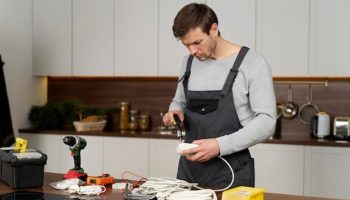Air conditioner systems are vital for surviving scorching days. But as a machine, they are bound to have issues. However, every issue is not too big to get professional help. It is essential to understand common air conditioning problems so that you can take preventive measures to avoid costly repairs. For example, when your air conditioner breaks down in the summer, it can end up making your days hot and long sleepless nights. While regular air conditioning maintenance will prevent many air conditioning problems, we have listed down common issues that your ac might be facing and their solutions.
Top reasons why your air conditioner is not keeping you cool:
Air Conditioner Is Not Working:
You must check your thermostat batteries when your AC is not working or turning on. Replace the batteries if they are dead. If the batteries are in working condition, check the thermostat settings to determine whether the cooling mode is on your desired temperature settings.
If your thermostat is turned on, but your air conditioner is still not working, check the circuit breaker. Your air conditioner will not turn on if the circuit breaker is tripped. Reset the circuit breaker by turning it off and then back on.
AC Is Not Blowing Cold Air:
If a dirty air filter obstructs your air conditioner’s airflow, it will not blow cold air.
A clogged air filter can further freeze the condenser unit, limiting the cooling power of your air conditioner. Changing your air filter once a month will assist your AC unit producing cold air.
AC Freezing Up Outside Unit:
Your air conditioner may freeze as a result of:
- Inadequate airflow
- The outside temperature is very low.
- Low levels of coolant
- Problems with the blower motor
- Contractor is stuck
AC Refrigerant Leak:
When the coolant in your air conditioner begins to leak, the temperature fluctuates, and the unit fails to perform properly. Leaks of refrigerant can cause:
- Ineffectiveness
- Power consumption is high.
- Freezing of coils
- Compressor failure
- Inconsistent cooling
Inspect your air conditioner for refrigerant leaks regularly.
Air Conditioner Producing Noises:
Depending on the type of problem, an air conditioner can produce a variety of sounds. There are several reasons why your air conditioner is making different noises:
- A refrigerant leak can produce a hissing sound.
- If you hear clicking sounds when you turn on and off your air conditioner, you may have a relay problem.
- Noises such as thudding, rattling, or banging indicate a problem with the blower or motor assembly.
- The compressor or fan motor
- produces a screeching noise.
- Faulty electrical components produce a buzzing sound
Evaporator Coil Frozen:
When your air conditioner does not receive enough air to operate, the evaporator coil freezes. A frozen evaporator coil can cause your air conditioner to freeze and stop working. Inadequate airflow in the system can be caused by blocked vents and ducts, dirty filters, or a faulty fan. A clean air filter is essential for optimizing airflow and indoor air quality.
Failure Of Electric Control:
When you turn on and off your air conditioner frequently, the fan controls and compressor can wear out. To start the unit, the condenser fan motor, compressor, and blower motor make an electrical connection. A faulty connection can prevent the motor and compressor from starting. To troubleshoot the problem, examine the electrical connections.
Water Leaking Outside from Air Conditioner:
Water leaking outside from your air conditioner on a hot or humid day, especially when the unit is running, is normal. It is also normal if the water leak occurs outside in cool weather with a temperature of 60 degrees or less, as the unit can freeze and leak water when it melts. Other causes of your air conditioner leaking outside include:
- Blocked up air filters
- Incorrect installation
- Drainage pipe clog
- Low levels of coolant
- Condensate pan shattered
Drainage Problem:
Dust, algae, and dirt can clog the drain pipeline as well. Mold, fungus, and mildew can grow if water does not drain properly. Gases and bad odors can also enter your home. To avoid this, make sure your drain line is maintained, cleaned, and inspected regularly. In addition, air conditioners that are not levelly mounted may not drain properly.
Conclusion
Your air conditioner stopped working because it was overworked and under-serviced.
Heating, ventilation, and air conditioning system (HVAC) problems must be addressed as soon as possible to avoid extreme temperature changes in the home. Air conditioner repairs can be expensive, so it is crucial to schedule regular air conditioning maintenance and tune-ups with experienced AC experts to enjoy the best AC performance.






